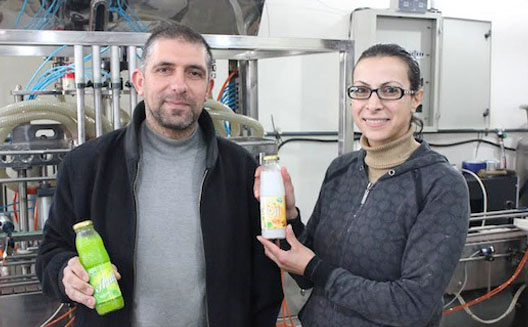Palestinian juice startup Ardy takes on market leader with a hyperlocal approach


In a Palestinian entrepreneurial scene gaining recognition for its globally minded tech startups, Ardy, a beverage company whose name means ‘my land’ in Arabic, is successfully serving up a hyperlocal product.
Walid and Souha Kuttab, a husband and wife team, started Ardy about a year and a half ago, with the idea was to carve out space in the Palestinian market for a beverage company producing and bottling juices from Palestinian fruit on Palestinian land.
The Palestinian juice market
The Palestinian Juice market is dominated by two large companies: Tapuzina and Cappy. Tapuzina is an Israeli company, and Cappy is a trademark of Coca-Cola. All of Tapuzina’s juices are made in Israel.
Cappy, on the other hand, bottles its products in Palestine, but the recipes and ingredients come from overseas. Only water and sugar are added during the bottling process, according to Walid.
Aside from Tapuzina and Cappy, there are only one or two small Palestinian beverage producers, and a small number of other brands from Arab countries.
In this sparsely populated market, Walid and Souha saw the opportunity to create a niche for themselves by making a local product that would also help bolster the Palestinian economy. “Our idea was to produce from natural [ingredients] and from fruit that comes directly from farmers,” Souha says.
Made in Palestine
The lemons that go into Ardy’s juices are from Ein Areek, a village close to Ramallah that regularly produces a surplus crop because it does not have enough buyers. The grapes for Ardy’s juice come from Hebron, and the oranges and grapefruits from Jericho.
Ardy’s factory is located in the basement of their house in Al-Bireh. The company is essentially a family operation, with multiple generations helping out with the production process.
Even Ardy’s labels are made in Palestine; Walid has them printed in Bethlehem.
Obstacles
While the couple would love to have their juices be entirely made-in-Palestine. there are certain essential pieces of equipment that go into juice production that are near-impossible to obtain in the Territories. Walid and Souha, however, developed ingenious solutions to the scarcity problem.
 For a pasteurizer, which new can cost up to
$100,000 from China, Europe, or Israel, the couple paid a visit to
an Israeli factory, where Walid copied the design of a pasteurizing
machine. He took the design to an engineer friend of his, and
together they built the machine, which, he says, works very
well.
For a pasteurizer, which new can cost up to
$100,000 from China, Europe, or Israel, the couple paid a visit to
an Israeli factory, where Walid copied the design of a pasteurizing
machine. He took the design to an engineer friend of his, and
together they built the machine, which, he says, works very
well.
Rather than buying a new filling machine, which is similarly expensive, Walid found a lightly used one for sale in Nablus, which, he claims, after some home repairs, works like new.
The biggest challenge Walid and Souha came across was procuring glass bottles for their juices, glass being the preference of Palestinian consumers, according to Souha. But, there are no Palestinian companies that make glass bottles.
Glass bottles were available in Israel, but they were expensive and irregular, as the best bottles were reserved for Israeli customers. When Walid and Souha looked to Egypt, they found that only packs of two millions bottles were available for sale – too expensive for a new startup. But when Walid and Souha explained their predicament with buying Israeli-produced glass bottles – and that they wanted to challenge Israeli juice in the Palestinian market – the Egyptian company decided to ship them glass bottles in smaller quantities.
Even then, the first shipment of glass bottles from Egypt took two months to arrive because of delays with Israeli customs. Subsequent shipments have arrived in a more timely fashion.
What’s next?
Despite the challenges, Ardy expects to produce between six and eight hundred thousand bottles of juice in its first year. They’ve already made a dent in this goal: in its first six months, the company produced more than 200,000 bottles.
At the moment, Ardy is producing eight different juices, all in individual-serving glass bottles. Their top seller is perennial Arab favorite lemon-mint. Their other offerings include staples like orange and grape, and flavors that are more off the beaten path, like almond and tamarind.
The company’s major buyers, for now, are universities, large Palestinian companies such as Jawal, and, increasingly, supermarkets and restaurants. As Ardy’s wholesale prices are slightly lower than Tapuzina’s, Walid and Souha are hoping to take some of the Israeli company’s market share. “We want to take a bit of this share to help some farmers, our family, and our work,” Souha emphasizes. “It’s not a war. It’s competition.”
For now, Ardy is focusing on making the highest quality product it can produce from local ingredients and their own recipes. “This is our point of strength,” Walid adds.
“Maybe after two to three years we can [become] much bigger,” he continues after being asked about exporting to Jordan or other Arab countries. “But, what is important is the roots.”


